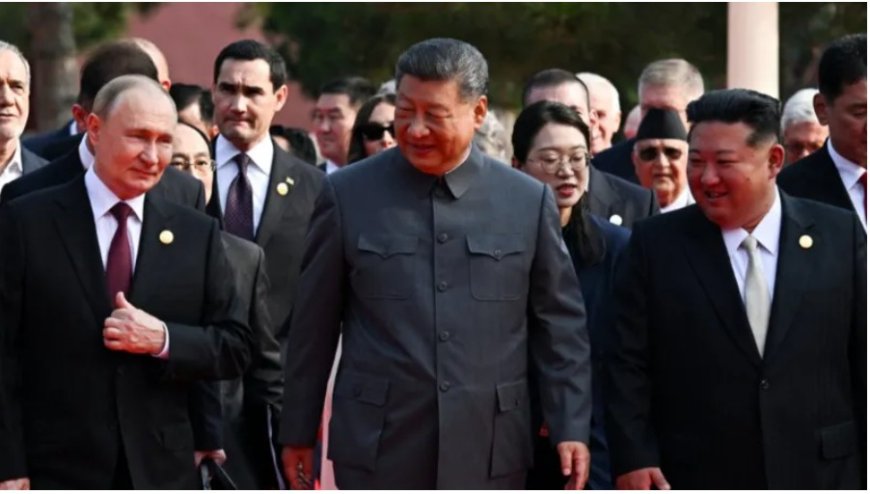The Leader’s Final Horizon: The Hubris of Immortality and the Fragility of Legacy
An analysis of the reported quest for immortality by leaders like Putin and Xi, contrasting the ambition for biological longevity with the pursuit of a lasting historical legacy built on peace and justice. The article argues that true immortality for leaders is found not in extending life, but in creating a better world.

WRITTEN BY YUSUF İNAN
The Leader’s Final Horizon: The Hubris of Immortality and the Fragility of Legacy
At one of the most critical junctures in modern history, two of the world’s most powerful leaders, Vladimir Putin and Xi Jinping, were observed whispering about a subject far more ancient than the fate of nations: longevity, and perhaps, even immortality. This brief, unguarded dialogue revealed the most intimate ambition of the modern authoritarian psyche: the drive to transcend not only political control and geopolitical dominance but also biological destiny itself. Reports that Putin is pursuing immortality through organ replacement, allegedly ordering the establishment of a special institute for this purpose, coupled with Xi’s belief that a 150-year lifespan is possible, suggest this quest has moved from mere wishful thinking to a tangible project.
This modern Methuselah project, however, raises a profound and unsettling question about the nature of leadership and legacy: Is a leader’s immortality found in the extension of their own lifespan, or in the endurance of the peace and justice they leave behind?
The Paradox of Power and Piety
Vladimir Putin often quotes the Holy Quran, cultivating the image of a leader who sends messages of unity and brotherhood, particularly to Muslim populations within the Russian Federation. Indeed, he once made a global call for divine unity by reciting a verse: “And remember the favor of Allah upon you - when you were enemies and He brought your hearts together and you became, by His favor, brothers.” (Surah Al-Imran, 103). Yet, the invasion of the “brother nation” of Ukraine immediately following such calls, displacing millions and causing the deaths of countless innocents, exposes the great paradox of modern power: the willingness to use the unifying spirit of sacred texts as a political instrument while simultaneously ignoring their deep wisdom on humility, fate, and the finality of death.
The same Surah Al-Imran, which Putin favors, also speaks directly to the greatest fear of those in power: “...Even if you had been in your houses, those destined to be killed would have come forth to their places of death.” (Surah Al-Imran, 154). This divine decree is a stark reminder that even within the most fortified palaces, armed with the most advanced medical technology, the appointment of death is inescapable. At this point, the leaders' quest for biological immortality becomes a futile challenge against a divine fate.
Two Paths to Immortality: The Legacy of Solomon or the Ambition of Caesar
History offers leaders two distinct paths to immortality. The first is the path of Caesar: the ambition to extend one’s biological existence and absolute control through power and technology. This path inevitably produces conflict, invasion, and destruction. The leader, prioritizing the extension of his own life above all else, makes the world pay a tragic price for his ambition—a price paid in the blood spilled in Ukraine, in Gaza, in Syria. This path may grant a leader a few more decades of life, but when he finally exits the stage of history, he leaves behind only chaos and resentment.
The second path is that of King Solomon, who symbolizes the historical legacy earned through justice, wisdom, and peace. Solomon is immortalized not merely as a king who commanded the wind and understood the language of birds, but as a just ruler. His legacy lies not in the splendor of the palaces he built, but in the memory of the justice he established. For such leaders, death is not an annihilation but, as expressed in the wisdom of Risale-i Nur, a "discharge from duty," a "relocation" to a place of eternal peace. Their true immortality is the gratitude and respect felt by humanity whenever their names are spoken.
A Call for a New Legacy: Can Leaders Be Immortal?
Yes, world leaders like Putin, Xi, and Trump can achieve immortality. Not through organ transplants or genetic interventions, but by demonstrating the will to unite humanity in a bond of love and brotherhood. Of what benefit to humanity is a Putin who lives for 500 years, if that time is spent orchestrating new invasions and conflicts?
The true elixir of life lies in the choice of the world’s great powers—China, Russia, the United States, and others—to pursue peace and equitable sharing, not competition and destruction. It lies in preventing human tragedies like those in Gaza, in striving for systems of democratic and just governance, and in pulling humanity back from the brink of annihilation to a more livable world.
At this critical moment, world leaders face a choice: to set the world on fire in an attempt to prolong their own mortal existence, or to leave behind an immortal legacy of peace within their own finite lifespans. History will deliver its verdict based on this choice.

YUSUF İNAN / PEACE AT HOME, PEACE IN THE WORLD (*)
Twitter : @Yusufinan2023
Instagram : yusufinan2023
Instagram : fondinan2016
Email : [email protected]
Website : www.yerelgundem.com
(*) As Mustafa Kemal Atatürk, the founder of modern Turkey, once said, 'Peace at Home, Peace in the World.' This timeless principle serves as a guiding light for nations striving for harmony, coexistence, and global stability.





















